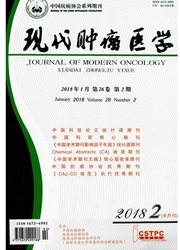

 中文摘要:
中文摘要:
目的:探讨喉返神经损伤在甲状腺癌手术中的发生原因及预防措施。方法:收集本科2009年1月至2013年1月收治的126例甲状腺癌患者的临床资料,分析喉返神经术中损伤的主要原因、预防措施及损伤后补救措施。结果:126例甲状腺癌患者中,喉返神经总损伤率为4.0%(5例),其中永久性损伤2例(1.6%),暂时性损伤3例(2.4%)。术后纤维喉镜检查均显示单侧声带运动障碍,经扩血管、营养神经、维生素药物等治疗后,3例术后6月内声带运动障碍消失,而2例术后随访1年未见功能恢复。结论:甲状腺癌术后喉返神经的损伤与癌肿在环甲关节区域侵及的范围、手术方式相关。术者的临床经验、术中与家属沟通后的手术方式选择及手术精细技巧对喉返神经的保护具有重要意义。
 英文摘要:
英文摘要:
Objective:To discuss the laryngeal recurrent nerve injury related factors and precaution in the thyroid gland carcinoma operation. Methods:Clinical data of 126 thyroid gland carcinoma patients was analyzed on the main cause,precaution and the remedy measure after the injury of the laryngeal recurrent nerve during the operation. Re-sults:In 126 thyroid gland carcinoma patients,the laryngeal recurrent nerve total injury rate was 4. 0%(5 cases),the eternal injury were 2 cases(1. 6%),the temporary injury were 3 cases(2. 4%). The unilateral vocal cord showed the dysKinesia through the fibrolaryngoscope examination,after the treatment such as vasodilator medicine,neurotro-phic drugs vitamins medicine,3 cases thyroid gland carcinoma patients vocal cord dysKinesia were disappeared and 2 patients vocal cord dysKinesis were not restored in 1 year follow-up. Conclusion:Thyroid gland carcinoma postopera-tive laryngeal recurrent nerve injury are relevant to the carcinoma invasive scope in cricothyroid joint region,operation style. The operator clinical experience,surgical style option after the intraoperative communication with families and the operative delicate sKills are of significance for the laryngeal recurrent nerve protection.
 同期刊论文项目
同期刊论文项目
 同项目期刊论文
同项目期刊论文
 期刊信息
期刊信息
